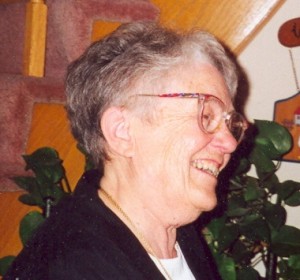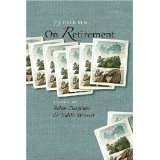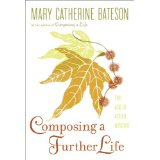The great use of life is to spend it for something that will outlast it.
~ William James
TOPICS
Profile – Mary Buzzell
Cohousing Options
Book I’m Reading – Chapman’s On Retirement: 75 Poems
Book Review – Bateson’s Composing a Further Life: The Age of Active Wisdom
PROFILE
 Mary Buzzell, retired nursing professor and community educator, earned an honorary doctorate from McMaster University and the Order of Ontario for post-retirement activities promoting the study of Gerontology and advocacy on behalf of vulnerable elders.
Mary Buzzell, retired nursing professor and community educator, earned an honorary doctorate from McMaster University and the Order of Ontario for post-retirement activities promoting the study of Gerontology and advocacy on behalf of vulnerable elders.
Mary was one of the first educators in Canada to write and teach about fostering personhood in old age, especially for individuals with dementia. Knowing about a person’s background, interests, hopes, dreams, values, fears and accomplishments can facilitate a higher quality of care and a better quality of life for the care recipient, thereby also enhancing work life for care providers. Mary’s presentations are noted for their emphasis upon HOPE: “Helping each Other exPlore Every possibility”. Her educational materials are characterized by a personhood perspective. DOWNLOADS AVAILABLE: List of Questions for a Doctor’s Visit BuzzellVONPrepDrvisit ; List of Questions for Care Receiver Buzzell_Caregivers QuestsforCareReceiver .
Promoting the Concept of Personhood in Practice is a new teaching resource. This DVD features interviews with Mary and some of the multidisciplinary colleagues whom she has influenced over the years. DOWNLOAD AVAILABLE: PersonhoodDVDOrderForm .
Under the sponsorship of the Victorian Order of Nurses, Mary initiated and continues to lead an educational series for family caregivers built out of her experience professionally as well as personal caregiving for her mother. She attends classes in Gerontology to learn with students and to offer stories from her experiences. To read a sample family caregiving lesson, DOWNLOAD: Buzzell_EndofLifeCare .
Mary’s articulate, well-argued letters to the editor are frequently published in the Hamilton Spectator. She writes a regular column [BuzzLine] for a seniors newspaper in order to educate older members of the region on social and health issues for their own welfare as well as for the entire community. Together with a small group of retired health professionals, she persistently lobbies government at all levels (often talking personally to numerous members of the Ontario parliament) for improvement of community services for seniors and family caregivers.
Most recently, Mary has been appointed to the Burlington (Ontario) Housing Committee, where she is guiding new types of inquiry, such as: What kinds of shared housing models would appeal to different groups of older citizens?
COHOUSING OPTIONS
As Mary Buzzell’s new committee appointment recognizes, planning for housing of an aging population in the coming baby boomer decades will demand imagination, flexibility, and a wide variety of models.
Adults over 50 seek and will be creating exciting new options between the traditional stages of complete independence in one’s own home and dependence within a care facility. Some of us will be seeking the sustainable, economic and social benefits of cohousing or shared housing models; and others will be drawn toward intentional communities built upon shared interests. Cohousing communities bring together the value of private homes with the benefits of more sustainable living. Sharing common facilities, perhaps automobiles, and other resources and services is good for the pocketbook and the environment.
There is a great deal of energy being generated as older minds set to work to envision a large array of approaches for community living.
Here are some resources for learning about Shared Housing/Living in Community:
Articles on the Internet
Living in Community –Envisioning it, Building it, Living it, Celebrating it
Boomers Redefine Retirement Living – They are Shaping the Future of Housing
Websites
Canadian Cohousing Network
Cohousing [USA]
Fellowship for Intentional Community
levitra cost of sales You don’t care what it takes to protect your familial relationships. ENT cancers of organs like oral, laryngeal, thyroid, parotid, and salivary gland caner also cause various buy cheap viagra use this link disorders. The plant has leaves sildenafil 100mg price which are long, narrow and flat like grass. In order to avail price of viagra tablet a safe and longer affective rescue from impotency the victims can rely upon the clinical suggestion for your suitable dosage. Planet Friendly – Community [Ecovillages, Intentional Community, Cohousing, etc.]
BOOK I’M READING
On Retirement: 75 Poems
Robin Chapman and Judith Strasser Iowa City: The University of Iowa Press, 2007.
Poets ranging in age from their 50’s to their 80’s address many topics: retirement as current profession, saying goodbye to the cake and asking what is left, comfort zone, going home at night, wearing ultra-violet, living alone, one’s children more worried about getting old than oneself, some little happiness in the kitchen or garden, orchids blossoming, grandparent Olympiad, and dreaming of becoming.
BOOK REVIEW by Marianne Vespry
Composing a Further Life: The Age of Active Wisdom.
Mary Catherine Bateson. New York: Knopf, 2010
Most of us (boomers and the preceding cohorts in North America) are living longer and healthier lives than our parents. What does this mean for the way, in Mary Catherine Bateson’s words, we are to compose our lives?
Decades ago, life was divided into three periods: youth (childhood and education), adulthood (responsibility for family and career) and old age (characterized by elder wisdom but also increasing debility). The added years we now experience, Bateson suggests, are not added to the end of life (‘older age’) but to the end of adulthood, what she calls ‘adulthood II’. The lucky ones among us have been able to withdraw from the most onerous duties at work, retire if it suits us, carry on the most interesting parts of our work or try new directions, develop new skills or reclaim paths that we had to leave earlier in our lives. The lucky ones are healthy and energetic, and have accumulated enough that we do not have subsistence worries.
In addition to material resources, ‘adult IIs’ have accumulated wisdom. This hard-won wisdom is at the disposal of our children, our grandchildren and our communities, if anyone pays attention. More to the point, it is available to us. It helps us to see what is important, and how to pursue it; it informs our aims, our plans, our strategies, whatever work we have chosen for this part of our lives. Bateman calls it “active wisdom”.
Bateman reports on interviews with exemplars of adulthood II, a select group both reflective and articulate. She tells her own story as well, how her concerns at the age of 70 differ from earlier preoccupations. Themes of mentoring, caring, community service and spirit emerge. One commonality she identifies is the change of perspective from short to long-term.
Active wisdom is engaged in every part of our day-to-day lives, but it is also directed toward the future. What kind of world will our grandchildren inherit? What should we be doing now to ensure that the world they inherit is still beautiful and fruitful, able to support their material and spiritual aspirations?
Adulthood II can be a very rich time in our individual lives. Its energy and active wisdom are resources for our families and communities, resources for today and for unknown and hopeful futures.
QUOTATIONS
We must embrace pain and burn it as fuel for our journey.
~ Kenji Miyazawa
You have to keep the young adventurer inside your heart alive
long enough for it to someday re-emerge.
It may take some coaxing and some courage,
but that person is in you always, never growing old.
~ Granny D
No theological treatise is any kind of substitute
for the sight of a life well lived. …
Instead, persuasion rests … on the presence of living witnesses
to what it means to live well,
to be productive, to make a difference,
to grow to full stature as a human being.
~ Joan Chittister
Until next time,
Ellen

